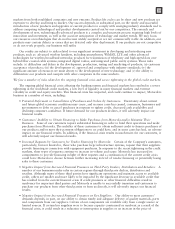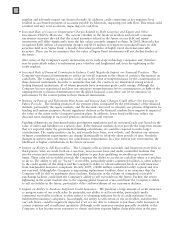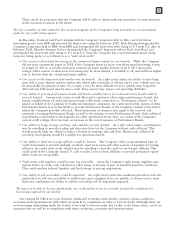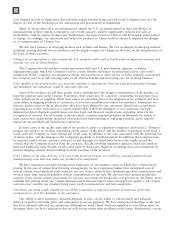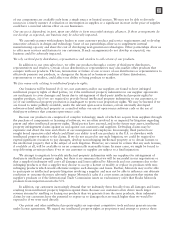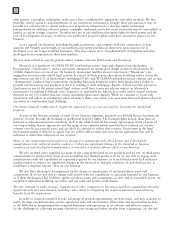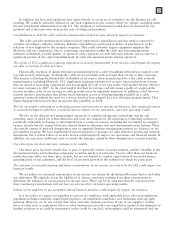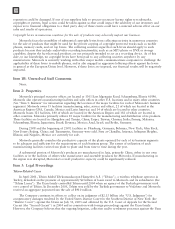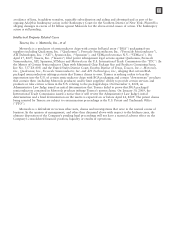Motorola 2008 Annual Report Download - page 37
Download and view the complete annual report
Please find page 37 of the 2008 Motorola annual report below. You can navigate through the pages in the report by either clicking on the pages listed below, or by using the keyword search tool below to find specific information within the annual report.
In addition, the laws and regulations that apply directly to access to, or commerce on, the Internet are still
evolving. We could be adversely affected by any such regulation in any country where we operate, including under
the new presidential administration in the U.S. The adoption of such measures could decrease demand for our
products and at the same time increase the cost of selling such products.
Consolidations in both the cable and telecommunication industries may adversely impact our business.
The cable and telecommunication industries have experienced consolidation and this trend is expected to
continue according to industry estimates. Industry consolidation could result in delays of purchases or in the
selection of new suppliers by the merged companies. This could adversely impact equipment suppliers like
Motorola and our competitors. Due to continuing consolidation within the cable and telecommunications
industries worldwide, a small number of operators own a majority of cable television systems and account for a
significant portion of the capital spending made by cable telecommunications systems operators.
The effects of FCC regulations requiring separation of security functionality from set-tops could negatively impact
our sales of set-tops to cable providers.
Historically, reception of digital television programming from a cable broadband network has required a set-
top with security technology. Traditionally, cable service providers sold or leased their set-top to their customer.
This security technology has limited the availability of set-tops to those manufactured by a few cable network
manufacturers, including Motorola. FCC regulations requiring separation of security functionality from set-tops
that are aimed at increasing competition and encouraging the sale of set-tops in the retail market became effective
for most customers in 2007. As the retail market develops for set-tops and televisions capable of accepting the
security modules, sales of our set-tops to cable providers may be negatively impacted. In addition, a full two-way
security interface specification that allows retail customers access to all programming available on a cable
operator’s network without the need for a set-top box has been adopted by a few television manufacturers. They
began shipping television sets that incorporate this capability in 2008.
We rely on complex information technology systems and networks to operate our business. Any significant system
or network disruption could have a material adverse impact on our operations, sales and operating results.
We rely on the efficient and uninterrupted operation of complex information technology systems and
networks, some of which are within Motorola and some are outsourced. All information technology systems are
potentially vulnerable to damage or interruption from a variety of sources, including but not limited to computer
viruses, security breach, energy blackouts, natural disasters, terrorism, war and telecommunication failures. There
also may be system or network disruptions if new or upgraded business management systems are defective or are
not installed properly. We have implemented various measures to manage our risks related to system and network
disruptions, but a system failure or security breach could negatively impact our operations and financial results. In
addition, we may incur additional costs to remedy the damages caused by these disruptions or security breaches.
Our share price has been and may continue to be volatile.
Our share price has been volatile due, in part, to generally volatile securities markets, and the volatility in the
telecommunications and technology companies’ securities markets in particular. Factors other than our financial
results that may affect our share price include, but are not limited to, market expectations of our performance,
spending plans of our customers, and the level of perceived growth in the industries in which we participate.
The outcome of currently ongoing and future examinations of our income tax returns by the IRS could impact our
financial results.
We are subject to continued examination of our income tax returns by the Internal Revenue Service and other
tax authorities. We regularly assess the likelihood of adverse outcomes resulting from these examinations to
determine the adequacy of our provision for income taxes. There can be no assurance that the outcomes from
these continuing examinations will not have an adverse effect on future operating results.
Failure of our suppliers to use acceptable ethical business practices could negatively impact our business.
It is our policy to require our suppliers to operate in compliance with applicable laws, rules and regulations
regarding working conditions, employment practices, environmental compliance and trademark and copyright
licensing. However, we do not control their labor and other business practices. If one of our suppliers violates
labor or other laws or implements labor or other business practices that are regarded as unethical, the shipment of
finished products to us could be interrupted, orders could be canceled, relationships could be terminated and our
29


